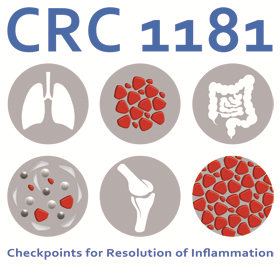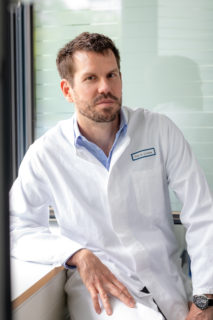When macrophages let off steam
Changes in cell metabolism protect macrophages from overloading and thus assist the resolution of inflammatory reactions
New data from a research team at FAU shows how inflammatory reactions can be resolved by changes to the metabolism of macrophages. Danger signals released by damaged cells during inflammation play a role during this process. ‘Rewiring’ the mitochondria in the macrophages protects them against overloading and can thus improve the way in which parts of damaged cells are eliminated and resolve the inflammatory reaction. The results were recently published in the journal ‘Immunity’.
Inflammation is a natural and vital response of our immune system to danger signals and tissue damage. Inflammatory processes help the body to eliminate the triggers, for example bacteria, and to initiate repair mechanisms. Terminating this inflammatory reaction quickly and in a coordinated manner is just as important, however, as otherwise there is a risk of developing chronic inflammatory conditions such as rheumatoid arthritis or Crohn’s disease. One of the important factors for resolving the inflammatory reaction is the elimination of damaged and dead cells, a process that was not very well understood until now. New inflammation can occur if these cells are allowed to accumulate.
How waste from inflammation is disposed of
A research team led by Prof. Gerhard Krönke at the Department of Medicine 3 – Rheumatology and Immunology at Universitätsklinikum Erlangen has now succeeded in gaining a better understanding of the fundamental molecular mechanisms involved. The researchers investigated the function of macrophages at the site where inflammation occurs. These cells are capable of ingesting large quantities of cellular waste and digesting and eliminating the molecular components of this waste in their mitochondria, also referred to as the powerhouse of the cell.
The scientists were able to demonstrate that the danger signal interleukin 33, which is released from damaged cells, triggers lasting changes to the metabolism of macrophages, so that their waste disposal capacity significantly increases. The sheer quantity of waste produced during the inflammatory reaction places the mitochondria under severe strain, and they produce increased quantities of damaging oxygen radicals as a result. Interleukin 33 regulates the function of the mitochondria by initiating a process known as uncoupling in these cell components and protecting them from overloading. ‘This enables the macrophages to ‘let off steam’ and carry on ingesting waste without interruption despite the heavy strain placed upon them, resolving the inflammation processes as a result,’ explains Maria Faas, lead author of the article recently published in the journal ‘Immunity’.
Protection of mitochondria as a new approach for therapy for inflammation
The findings of the FAU team could pave the way for new approaches for treating chronic inflammatory conditions. ‘It may be possible to accelerate and support the resolution of inflammatory processes in the long term by influencing the cell metabolism of the macrophages and deliberately uncoupling their mitochondria,’ explains Prof. Gerhard Krönke. Interestingly, substances that positively influence the cell metabolism of macrophages have already been discovered. However, they have not yet been approved for use in chronic inflammatory conditions and must undergo further clinical trials. The investigations and experiments were conducted as part of the DFG collaborative research centre CRC 1181 ‘Switching points for resolving inflammation’ and the DFG research group FOR2886 PANDORA (Pathways triggering Autoimmunity and Defining Onset of early Rheumatoid Arthritis). Maria Faas also received a scholarship as part of the DFG research training group 1660 (Key signals of adaptive immune response).
DOI: 10.1016/j.immuni.2021.09.010
Further information:
Prof. Dr. Gerhard Krönke
Professorship for Translational Immunology
Phone: +49 9131 85 34742

